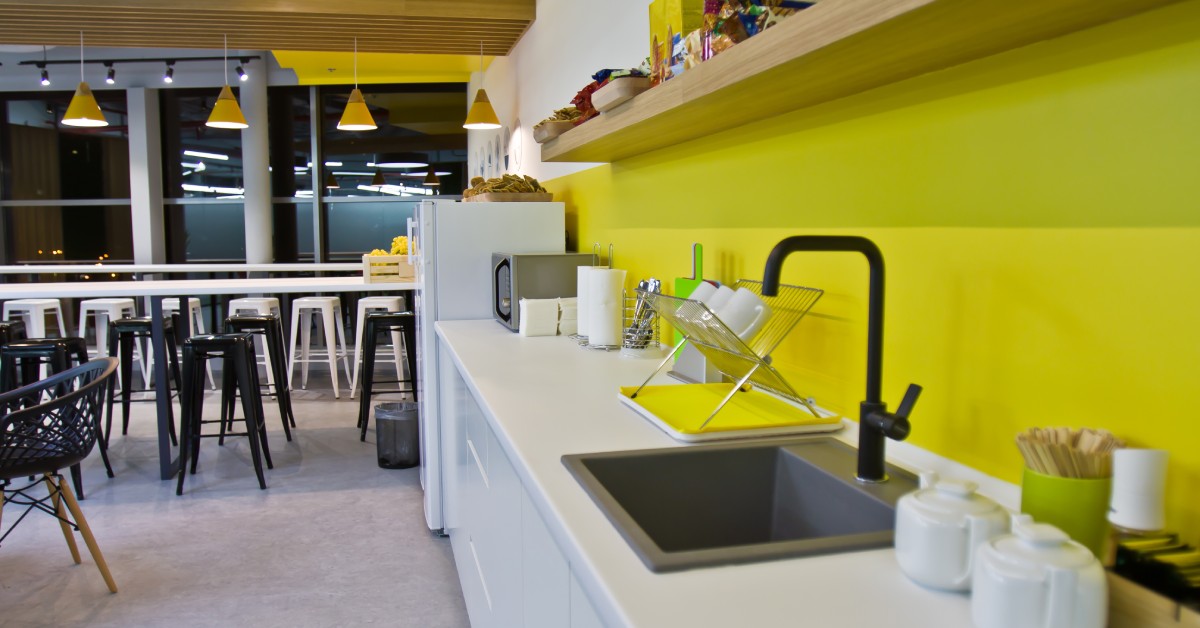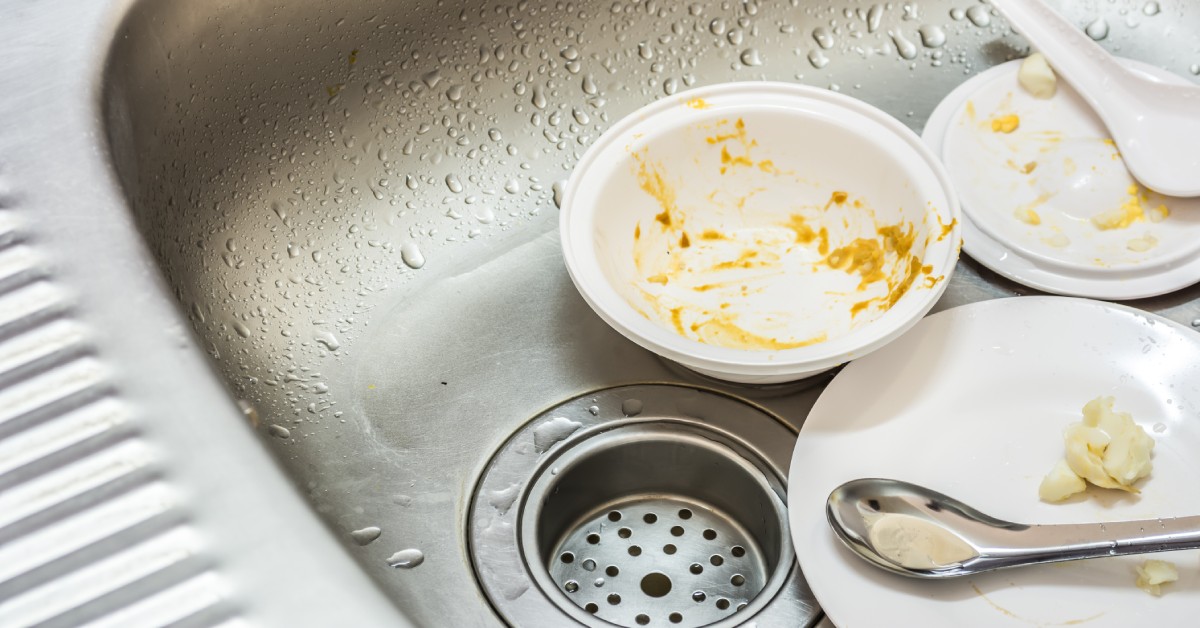
27 Aug The Hidden Dangers of Neglected Office Kitchens
Office kitchens are so much more than just a shared space to store lunches or grab a quick coffee. They often serve as the beating heart of workplace culture, a hub for informal conversations and collaboration, and a place where employees can recharge.
Despite their importance, office kitchens are some of the most neglected areas in a workplace. This disregard can create a range of hidden dangers that harm employee health, morale, and productivity. Learn about the hidden dangers of neglected office kitchens, and create a work atmosphere everyone will thrive in.
The Impact of Poor Hygiene
One of the worst dangers of a neglected office kitchen is poor hygiene. Over time, overflowing trash cans, unwashed dishes, and forgotten food in the refrigerator can lead to the growth of bacteria and fungi.
Common pathogens, like E. coli, Salmonella, and Listeria, can thrive in such environments, posing serious health risks to employees. Cross-contamination is common when countertops, sponges, or utensils aren’t clean.
Unclean coffee machines and kitchen appliances are equally concerning. For example, shared coffee pots or kettles with mineral deposits or mold growth are breeding grounds for harmful microorganisms. Consuming drinks or food prepared in such conditions can result in foodborne illnesses, stomach discomfort, or serious infections.
Pests and Their Consequences
Neglected kitchen areas may inevitably attract pests, such as ants, cockroaches, and rodents. These unwelcome visitors can quickly turn an office kitchen into a hazardous zone.
Cockroaches, for example, are known carriers of Salmonella and can trigger asthma or allergic reactions in sensitive individuals. Rodents, on the other hand, can contaminate food supplies, damage property, and spread diseases such as Hantavirus and Leptospirosis.
Once pests establish a presence in a neglected kitchen, the infestation can spread to the rest of the office building. Beyond the health risks, the presence of pests can severely damage a company’s reputation and demoralize employees who expect a clean, safe work environment.
The Psychological Fallout
Cluttered, dirty office kitchens can also take a toll on employee well-being and morale. When workers repeatedly encounter unwashed dishes, spill-stained counters, or abandoned leftovers, frustration and resentment often set in. A dirty, disorganized kitchen sends a message that the company doesn’t care about fostering a clean and respectful workspace.
This lack of shared responsibility can breed tension among team members; employees may begin to blame one another for the mess and create workplace conflicts. The inability to prepare or store food in a safe, clean environment may force employees to rely on other options for meals and snacks, further reducing the quality of their workday experience.
The Impact on Productivity
While it might not be immediately apparent, a neglected office kitchen can hinder productivity. Poor hygiene and pest problems can lead to an increase in sick days as employees fall ill due to exposure to harmful bacteria or allergens. Frequent absences disrupt workflows, create strain for team members who need to pick up the slack, and decrease workplace efficiency.
Beyond health concerns, employee dissatisfaction stemming from an unkempt kitchenette can diminish motivation. When workers don’t feel respected in their shared spaces, they’re less likely to feel invested in their company.
Best Practices for Office Kitchen Management
The dangers of neglecting an office kitchen are clear, but the good news is that mitigating these problems is entirely possible with some proactive measures. Here are several best practices to keep office kitchens clean, safe, and welcoming:
Set Clear Responsibilities
Establish policies that outline who is responsible for cleaning up after themselves. Consider implementing a rotating schedule for minor duties, such as wiping down counters and taking out the trash, to share accountability.
Regular Professional Cleaning
While employees can contribute to daily upkeep, leadership should schedule professional cleaning services to sanitize the space thoroughly. Professional cleaners can tackle appliances, hard-to-reach areas, and deep-cleaning tasks that go beyond surface tidiness.
Invest in Proper Storage and Supplies
Providing adequate storage, such as labeled shelves and containers, can reduce clutter and prevent food from being forgotten or left to spoil. Stock the kitchen with basic cleaning supplies, including disinfectant wipes, dish soap, and clean sponges.
Encourage Safe Food Handling
Share tips or guidelines with employees about food safety, such as discarding perishable items before the weekend and labeling leftovers with dates. Creating visual reminders or posters can help to reinforce best practices.
Schedule Regular Refrigerator Cleanouts
Designate a day weekly or bi-weekly to empty out the refrigerator. Discard unclaimed or expired items to prevent unpleasant odors or mold and bacterial growth.
Monitor for Pests
Employ pest control services to perform routine inspections and take preventive measures. If pests are already present, an extermination plan should be enacted quickly to avoid further contamination.
Fostering a Healthy Kitchen Culture
Above all, the key to maintaining a clean and safe office kitchen lies in fostering a culture of respect and shared responsibility. When employees feel ownership over their shared spaces, they are more likely to contribute to their upkeep. Encouraging open communication about expectations and providing feedback on areas of improvement can go a long way in preventing issues before they arise.
Leaders and managers play a role in reinforcing these values. By washing their own dishes, tidying up after meetings, or praising employees who contribute to kitchen cleanliness, they can set a positive tone that inspires others to follow suit.
Don’t Put Off Cleaning
A clean office kitchen is an essential component of a healthy and productive workplace. By addressing the hidden dangers of neglected office kitchens, business owners and managers can minimize health risks, improve morale, and foster a strong sense of community among employees. With a little effort and attention to detail, office kitchens can become spaces where teams come together, grow, and thrive, one clean countertop at a time.
Don’t wait until a cluttered kitchen turns into a breeding ground for bacteria or mice. If you require commercial cleaning services in San Antonio, we’re happy to provide you with the professional cleaning assistance your office needs to succeed. Prioritize organization and cleanliness today to create an office environment that supports the success and well-being of everyone.



